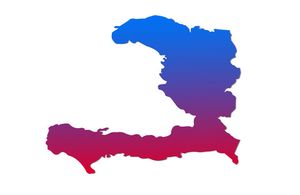The Symbolic Power of Home, Part 1: Michaelle Jean

I think that many Canadians’ imagination and empathy has been caught by news stories of our Governor General, Michaelle Jean, who has been in the news here quite a bit this week.
Her Excellency is herself a native of Haiti who came to Canada at age 11 in 1968. In the last few days, she has returned to her homeland in the wake of the devastation, as an emissary of hope and solidarity.
Michaelle Jean has been both very strong, and also very apparently in grief over the loss of human life and destruction in her homeland of Haiti and her home town of Jacmel. It is very clear how moved she has been, even shaken to the core. Yet in the midst of that she has delivered a clear and unshaken message of hope for the future. Clearly she is a very remarkable woman.
Her experiences should cause us to stop and reflect. It is hard for those of us who have not been through such an experience to imagine what it would be like to see one’s home, the place from which one sprang, facing such devastation, to face the death of many whom one has loved, and to see the places of one’s youth endure such damage.
Horrific as these experiences are, they teach us an incredible amount about the psychological significance of home… to ourselves — and to every human. It is the nature of human beings that we need a place to belong, a place that is fundamentally ours, where there are others to whom we are bound by ties that never break. The very bond with the land where we come into being is a very powerful one. The place that brings us to life marks us, shapes us, never truly lets us go.
Modern people tend to downplay the importance of place, and to feel that one country, one city, one house is interchangeable with another. This is particularly so in suburban places, like Oakville, Burlington or Mississauga. Here we often tend to think in terms of houses and the land they are located on as badges of particular social status or as arrangements of convenience, rather than as a fundamental reality that touches us in the deepest places in our being, in what we might very well call our soul. But increasingly, environmental psychology is demonstrating to us the unshakeable importance of place.
This is a matter of particular psychological importance for nations like Canada, the United States and Australia, which are predominantly immigrant cultures, or particularly mobile. The immigrant retains a psychological bond to the soil that brought him or her to life. That bond is not easily broken, and may be a matter of great personal significance to the individual. To come to terms with that bond, and to come to terms with the particular character of the new homeland may be a major piece of psychological work.
For Jungians, there is another dimension, also, to the symbolism of home, and that is an archetypal dimension. For the deepest and true home of all of us is the Self, the core of our being. Ultimately, it is only by connecting with one’s true identity and the unique reality that each of us is, that we can really come to feel at home in the world, and in our lives.
I’d gratefully welcome comments and reflections on the archetype of home. What does the symbol of “home” mean in your life? Where is home for you, a place that you associate with your own fundamental identity?
My very best wishes to you on your individual journey to wholeness,
Brian Collinson, Psychotherapist & Jungian Analyst
[cta]
PHOTO CREDIT: © Konstantin32 |Dreamstime.com
VIDEO CREDIT: © ‘A’ Morning Video, 2010 | //www.atc.ca/ottawa
© 2010 Brian Collinson


sts
Great info, thanks for useful post. I am waiting for more